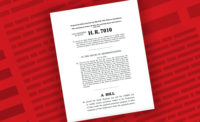A major construction contractors’ group is objecting to the paid family leave and sick leave provisions of a House-passed coronavirus bill, saying that the measure would have a severe impact on construction firms’ cash flow and could lead to major layoffs and company bankruptcies.
[For ENR’s latest coverage of the impacts of the COVID-19 pandemic, click here]
In a March 16 letter to Senate leaders, the Associated General Contractors of America said that the House legislation, which the chamber approved early on March 14 by a 363-40 vote, would require that small companies “front” the cost of up to 12 weeks of paid family leave and two weeks of medical leave, at a level equal to at least two-thirds of workers’ pay rates.
The provision would apply to companies with fewer than 500 workers.
[View summary of March 14 coronavirus bill here.]
AGC also finds the bill’s provision to offset the costs of the leaves by providing employers with a tax credit isn't satisfactory. For one thing, companies wouldn’t gain the benefits from that credit for weeks.
In the letter, Jimmy Christianson, AGC’s vice president of government relations, says that the leave mandate "at a time of extreme economic uncertainty among so many small business employers already exposed to cash-flow difficulties, could lead to mass layoffs, employer bankruptcies and supply-chain issues that could delay delivery of medical and emergency-response facility projects."
The contractor group says that instead of the tax credit, the federal government should pay for the medical and family leave. AGC didn't specify precisely what mechanism the government should use to make those payments. It did say the Trump administration should consider using agencies such as the Social Security Administration or the unemployment insurance program to help workers affected by the coronavirus.
Christianson also says that Congress also should consider other actions. They include requiring federal agencies and state agencies that use federal-aid construction funds to continue making payments to contractors for a year, even if projects are delayed, “to ensure such employers can maintain cash flows to pay employees’ salaries and benefits, and their subcontractors, especially small businesses."
In addition, he suggests cancelling for three months the payroll taxes that support Social Security and Medicare. Both employers and workers pay the payroll taxes."
AGC spokesman Brian Turmail said via email that it’s “too early to estimate the cost” to contractors of the leave provisions, “short of knowing that it would be very disastrous.”
Turmail added, “There are are just too many variables but there is no way firms can float the costs for 12 weeks until claiming their tax credits.”
The U.S. Chamber of Commerce also has advocated a payroll tax cut, which didn't make it into the March 14 House-approved bill.
The legislative picture has been fluid. A new development was House passage of legislation on March 16 making “technical corrections” in the coronavirus measure it had just approved two days earlier—the one that contained the family/medical leave provisions.
The text of that new corrections bill wasn’t immediately available. The next step would be Senate action on coronavirus legislation.
Also on March 16, Senate Minority Leader Chuck Schumer (D-N.Y.) said he planned to make “a series of proposals” to be included in a further coronavirus response bill. The “initial infusion” would be “at least $750 billion,” Schumer said.
He said his envisioned follow-up bill would provide “immediate help to small businesses,” among other things.
Story corrected on March 17 to clarify that AGC is suggesting generally that the federal government should be responsible for fronting payments for the House bill's medical and family leaves. The association recommends using agencies like the Social Security Administration and unemployment insurance programs as providing possible avenues to provide assistance to workers.
Separately, AGC is calling for a three-month cancellation of payroll taxes, but association officials say they are not saying that a payroll tax suspension should be the way to pay for fronting the medical/family leave costs.




Post a comment to this article
Report Abusive Comment